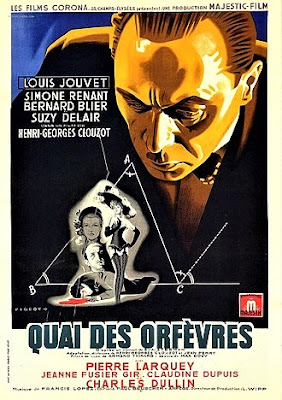Henri-Georges Clouzot's Quai des Orfèvres is based on Stanislas-André Steeman's policier novel Légitime défense, and was the director's first film after his four-year prohibition following Le Corbeau (1943). The setting is very much the French music-hall world, with Jenny (Suzy Delair) the wife of Maurice (Bernard Blier), who is also her piano accompanist. And being set in this world, it is also a film of jealousy.
Without going too far into the complicated plot, Maurice is insanely jealous of the lecherous rich old man Brignon (Charles Dullin), who Jenny sees as a stepping stone out of music-hall parochialism and into the cinema. But unfortunately, Maurice has been heard yelling death threats to Brignon, which doesn't help when Brignon is found murdered and Inspector Antoine is called in to sort the matter out. Nor does it help Maurice's case that he went out to kill the already dead Brignon when he knew that he had invited Jenny to see him on the same night, and that Jenny thinks she killed him with a champagne bottle to thwart the old man's sexual advances.
And, Maurice's alibi hanging by a thread, he is inevitably arrested but attempts suicide. Then Jenny admits to murder, but so does the lesbian Dora (Simone Renant) who is in love with Jenny. But as Antoine says, he's in a similar position to Dora: they're both unscuccessful with women, and anyway he thinks he knows the real killer. Police treatment of its suspects is very far from depicted in a noble light in this film, but at least the real killer is found in the end: Paolo (Robert Dalban), the ferrailleur who came to burgle Brignon on the same night, but, seeing him injured by the champagne bottle, shoots him dead. Time for a reconcilation between Jenny and Maurice. I think the importance of this film in the history of French cinema in general has been a little overrated.




No comments:
Post a Comment